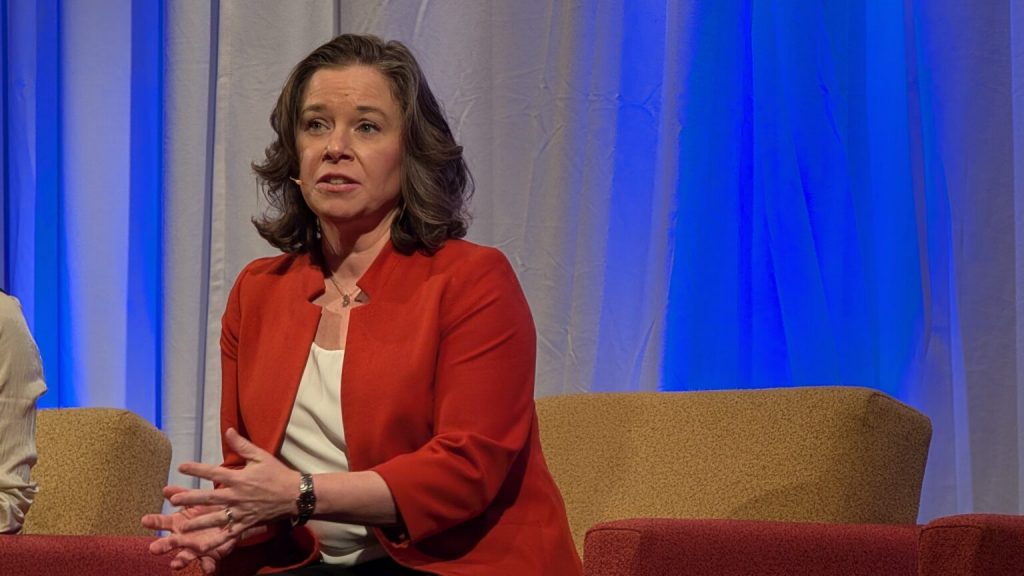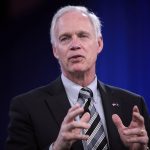Health Care a Top Issue for Sara Rodriguez in Governors Race
Wisconsin's Lt. Governor, a Democrat, is a former nurse and CDC health official.

Lt. Gov. Sara Rodriguez speaks during a Wisconsin Technology Council forum featuring Democratic and Republican hopefuls in the 2026 governor’s race Nov. 6, 2025. (Photo by Baylor Spears/Wisconsin Examiner)
The longest ever federal government shutdown that ended last week revolved around a top issue for Lt. Gov. Sara Rodriguez as she campaigns to be Wisconsin’s next governor: health and health care.
A registered nurse by training and former official at the Centers for Disease Control and Prevention, Rodriguez has been deeply involved in health care policy, first in her single term as a member of the Wisconsin Assembly and then, since 2023, as the No. 2 official in the state’s executive branch.
And, she says, it motivated her to declare her intention to succeed Gov. Tony Evers after Evers decided to stand down from the 2026 election.
“One of the reasons why I wanted to run is to make sure that we have somebody in a leadership position that, No. 1, understands health care, and No. 2, really gets how unaffordable and broken it is,” Rodriguez told the Wisconsin Examiner in an interview Monday.
She also sees a shift in the federal government away from established public health principles, forcing states to take the lead on setting public health standards. In the governor’s office, she said, her professional background would equip her to tackle those issues.
As a state representative, Rodriguez proposed a bill in the 2021-22 legislative term to accept the expansion of Medicaid — BadgerCare in Wisconsin — through the Affordable Care Act. Expansion would allow the state to enroll people with incomes between 100% and 138% of the federal poverty guidelines in Medicaid, with the federal government paying 90% of the additional cost.
When the ACA took effect, Gov. Scott Walker was in office and refused throughout his two terms as governor to accept the federal support and expand the program.
Evers defeated Walker in 2018 and promised to accept the federal expansion, but in the lame-duck session before he was sworn in, the Republican majority in the Legislature passed a bill that Walker signed, requiring the Legislature’s approval for expansion.
Since then, repeated attempts by Democrats to expand Medicaid, including the bill Rodriguez authored four years ago, have failed with Republican majorities in both houses of the Legislature.
Another form of Medicaid expansion — covering mothers for a year after they give birth — has the support of bipartisan majorities in the Senate and the Assembly, but Assembly Speaker Robin Vos (R-Rochester) has opposed bringing it to the floor.
“We are one of two states that have not done that — us and Arkansas,” Rodriguez said. “And I think Arkansas may be working on it. So we may be the only one left at the end of the day.”
Rodriguez’s political career started with her Assembly race in 2020, flipping a Republican seat in the Milwaukee suburbs. She followed that with her race for lieutenant governor in 2022 and now her campaign for the Democratic nomination to run for governor in 2026.
Throughout her political life, she said, she has been supported by 314 Action, a political organizing group seeking to elect more scientists and people in science-related professions, including health care.
During the recent federal government shutdown, Democrats in the U.S. Senate insisted that any resolution to fund the government also extend federal subsidies for health insurance under the ACA. The expiration of those subsidies at the end of this year will cause health insurance premiums to double, on average, participants in the ACA marketplace.
Ultimately, a handful of Democratic senators voted with the Republicans to advance a GOP-authored spending bill that ended the shutdown without addressing the looming health insurance cost spike.
But the issue won’t go away, Rodriguez said.
“We’re looking at a doubling of premiums,” she said. “A 60-year-old couple are looking $1,500 to $2,000 more a month to be able to pay for their health insurance. That is absolutely unaffordable for most Wisconsinites.”
The problem extends beyond just people who buy their insurance through the federal marketplace, she warned.
“The larger amount of people who are uninsured in the state, the higher our health care costs are going to get, because they’re going to wait, they’re going to delay care, they’re going to be sicker when they get into care, and it’s going to cost hospital systems more in terms of uncompensated care,” Rodriguez said.
“If people will go uninsured, it’s going to raise costs,” she added. “And continuing to talk about it, continuing to let people know how that works, is something that I’m uniquely equipped to do as a nurse, as somebody who’s worked within the health care system. And it’s one of the reasons why I’m running for governor.”
Rodriguez said she has seen the benefits that the ACA has brought in the last decade and a half.
Before it was in place, “people delayed care,” she said. “They came in sicker to my emergency department and it cost a whole lot more dollars to be able to treat them and they were out of work because they had to be treated within a hospital system as opposed to going to their regular doctor and being able to get the care that they needed and be able to take care of their diabetes, to take care of their hypertension. Those are the kind of things that the Affordable Care Act has allowed us to do.”
She said she’s heard from small business owners who were able to start a business because they could get health insurance thanks to the ACA.
“Do we need to fix it? Absolutely. Do we need to get it better? Absolutely,” Rodriguez said. “But to get rid of it is going to have devastating effects on health care in Wisconsin.”
Rodriguez said she also brings the perspective of health and health care to other policy topics.
“The medicine we give you, the procedures that we do — it’s such a tiny fraction of how healthy we are,” she said.
Food, housing and “a good-paying job to put a roof over our heads and to pay for the food we eat and to pay for the medications we’re prescribed” are health issues, too, Rodriguez said. That’s why housing affordability, for example, is part of her platform, she said.
“Tom Tiffany in the governor’s seat [is] not going to put a priority on lowering costs for Wisconsinites,” she said.
She also predicted that, if elected, Tiffany would sign laws restricting abortion in Wisconsin — “and that is going to be extraordinarily dangerous for people.”
Rodriguez views her science background as a strong selling point. “I think we want somebody who’s going to use data and science to make decisions,” she said.
Robert F. Kennedy Jr., President Donald Trump’s secretary of the federal Department of Health and Human Services, has been “using conspiracy theories as his underlying belief system, and that hurts real people,” Rodriguez said.
She cited surging measles cases in Wisconsin and nationally and the deaths of children in some states after the federal government weakened its support for vaccination.
“That hasn’t happened in a decade, and they’re continuing to feed this anti-science rhetoric that is going to harm our kids here in Wisconsin,” Rodriguez said. “I’ve been clear, I think RFK Jr. should resign. I don’t think he’s qualified for the job that he has and he’s actually a danger to public health across the country.”
In Wisconsin governor’s race, health care is a top campaign theme for Sara Rodriguez was originally published by the Wisconsin Examiner.
If you think stories like this are important, become a member of Urban Milwaukee and help support real, independent journalism. Plus you get some cool added benefits.





















